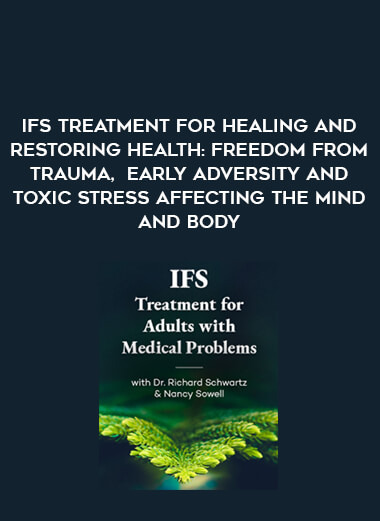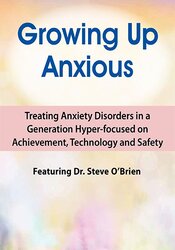IFS Treatment for Healing and Restoring Health: Freedom from Trauma, Early Adversity and Toxic Stress Affecting the Mind and Body
Faculty:
Richard Schwartz, PhD | Nancy Sowell
Duration:
14 Hours 29 Minutes
Copyright:
Dec 15, 2019
Product Code:
IRS035163
Media Type:
Online Course
IFS Treatment for Healing and Restoring Health:
Freedom from Trauma, Early Adversity and Toxic Stress Affecting the Mind and Body
Module One: Introduction to IFS for Healing and Restoring Health
- What the ACE Study Tells Us
- The Impact of Early Trauma and Adversity
- Health outcomes associated with ACEs
- Defining Successful Outcomes for Using IFS to Help Treat Disease
- Expectations-On Cure, Healing and Self
- Addressing Shame and Blame—when Parts Affect Health
- What we can and can’t control
- Perspective on parts, burdens and blame
- Overview: Burdens and Avenues of Impact on Health
- Clinical example: The Backlog of Pain
- Burdened Parts and their “Avenues of Impact on Health”
- The IFS RA Study Example
- The Outcomes
- The People
- The Treatment Groups
- Burdens and Alexithymia
- RA and a primary polarization related to chronic pain
- Meditation: Befriending the Stoic Protector
- Stoic Protector or Me?
- Unblending and Befriending
Module Two: How Burdened Parts with the Emotional and Autonomic Dysregulation from Toxic Stress, Trauma, or Unmet Core Needs Affect Health
- Regulation of the Stress Response System—the Autonomic Nervous System
- A regulated system—what it feels like, how it looks
- Core Needs for development of autonomic regulation
- Social Engagement System
- Sympathetic Nervous System
- Parasympathetic System; Dorsal vagus
- A dysregulated system
- Unprocessed toxic stress and trauma
- Social Engagement System
- Sympathetic Nervous System—perception and arousal
- Dorsal Vagus Response
- A regulated system—what it feels like, how it looks
- IFS Lens on Polyvagal Theory: Parts and Dysregulation
(Parts Examples of dysregulation of the above)
- Parts and neuroception
- Protectors
- Exiles
- Co-regulation
- In the therapeutic relationship
- “Self” regulation
- Inflammation and disease
- The link between seemingly unrelated diseases
- The link between fear, dysregulation and inflammation
- Gut-Brain connection
- Parts and Pain: Expectations and Pain Experience
- Diseases of toxic stress and trauma
- What are they?
- Facts from research
- Clinical Case: Walking Through an IFS Treatment of Dysregulation, Anxiety and Chronic Migraine Headaches
- Assessment
- Co-regulation in therapeutic relationship
- Moving into “Self” regulation
- Legacy Burden affecting health
- Finding the exile behind the protector
- Meditation
Module Three: Finding Parts Contributing to Health Problems with Clinical Examples
- Talking to Clients About the Concept of Parts Contributing to Disease and Affecting Health
- Defining Health, Healing and Wellbeing
- Allowing for skepticism and cynicism
- Parts affecting health
- Indirectly affecting health
- Directly affecting health
- Parts that want to die
- Parts that assist in healing
- Polarizations impacting health
- Clinical examples
- Assessing the Parts involved—Utilizing the “Avenues of Impact” for Finding the Parts Negatively Affecting Health
- Identifying dysregulation
- Protector roles
- Behavior and health
- Exiles involved
- Protector roles affecting health
- External relationships and parts
- Meditation/Experiential Exercise
Module Four: A Case Study in Working with Parts Related to Cancer—Finding and Working with the Parts Involved
- The Protective System
- Finding Exiles
- Important Information from a Part that Helps in Healing
- Healing:
- Hopelessness
- Fear and dysregulation
- “Self” Regulation
- Attachment wounds
- Working with Preverbal Parts
- Restoration of Hope and Connection
- Meditation and Closing
Richard Schwartz, PhDRelated seminars and products
IFS Institute
Richard Schwartz began his career as a systemic family therapist and an academic and he is now on the Faculty of the Department of Psychiatry at Harvard Medical School. He is also a Senior Fellow of the Meadows treatment center in Arizona. Grounded in systems thinking, Dr. Schwartz developed the Internal Family Systems (IFS) model in response to clients’ descriptions of various parts within themselves. In 2000, he founded the Center for Self Leadership (now IFS Institute – www.ifs-institute.com), which offers three levels of trainings and workshops in IFS for professionals and the general public, both in this country and abroad. A featured speaker for national professional organizations, Dr. Schwartz has published many books and over fifty articles about IFS.
Nancy SowellRelated seminars and products
Nancy Sowell, LICSW, is an Internal Family Systems (IFS) senior lead trainer, consultant, and therapist. She is a teaching associate at Harvard Medical School in the Department of Psychiatry at the Cambridge Health Alliance. Specializing in behavioral medicine and mental health interventions for pain and health problems, Nancy co-created an IFS treatment protocol and program for rheumatoid arthritis patients for a research study at Brigham and Women’s Hospital in Boston. The outcome of that program and study was the basis for the IFS model inclusion in the SAMHSA, National Registry of Evidenced-Based Programs and Practices in 2015.





 Salepage :
Salepage : 

























Reviews
There are no reviews yet.